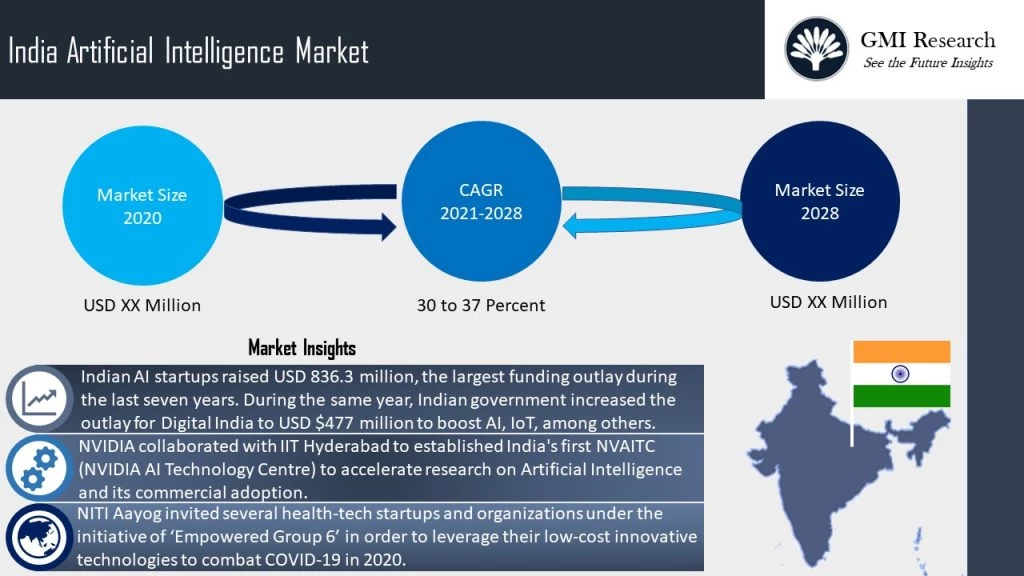Press Release
As per the GMI Research forecasts, growing AI implementation across large and SMEs to increase business operational efficiency stands to be one of major driver in the market. The market was estimated to be USD XX Million in 2020 and is predicted to reach USD XX Million by the end of 2028, while growing at a CAGR of 30% to 37% during the forecast period (2021-2028).
India is on its way to diversify its economy by adopting digital platform technologies such as IoT cloud platforms to simplify and increase its business performance due to rising investment by the leading players in the country. The Indian public cloud services economy contributed USD 1.9 billion to Indian GDP in 2017 which increased to USD 4.3 billion in 2020. This can be attributed to the growing adoption of cloud computing among SMEs and large-scale enterprises. Artificial intelligence is being used to collaborate with cloud computing technology to increase productivity, streamline workloads, and automate repetitive tasks within IT infrastructure. Thus, the rising adoption of AI technology and cloud services to manage, monitor, and even make corrections to systems without human intervention has created a massive demand for the AI market in India.
To have an edge over the competition by knowing the market dynamics and current trends of “India Artificial Intelligence Market” request for Sample Report here
Several leading cloud service providers are collaborating and partnering with government for making the use of AI technology for better efficiency across different sectors. For instance, in 2020, IBM announced the setting up of the Artificial Intelligence Centre of Excellence in partnership with the Government e-Marketplace (GeM). In addition to that, IBM India has also collaborated with the Karnataka Government and Niti Aayog to deploy precision AI-based agriculture solutions for helping farmers to make better decisions.
The rising government initiatives such as funding to promote the adoption of AI in India is one of the significant factors that will elevate adoption in the coming years. In 2020, NITI Aayog invited several health-tech startups and organizations under the initiative of ‘Empowered Group 6’ in order to leverage their low-cost innovative technologies to combat COVID-19. In 2021, the government also partnered with US to launch US India Artificial Intelligence (USIAI) to scale up the S&T relationship between India and the United States to solve problems of both countries. USIAI Initiative focuses on AI cooperation in critical areas that are priorities for both countries.
Recent policy documents and working drafts on Artificial Intelligence issued by the Niti Aayog recognize ethical and fundamental concerns with the implementation of AI and hint towards a self-regulatory approach towards the same in the future. Policy documentation identifies ethical challenges in AI based on their impact on the Indian society while recognizing the issues such as the ‘Black Box Phenomenon’, the issues of data collection without proper consent, the privacy of personal data, inherent selection bias, risk of profiling and discrimination, and non-transparent nature of certain AI solutions.
On the basis of offering, the software segment is expected to witness high CAGR in the coming years. Software in AI are being used to optimize business operations, automate procedures, and derive business insights. Launch of different AI based software by players, growing number of AI start-ups along with strategic acquisitions will further contribute to market development. For instance, AI-based startup, BlackBuck is a web & AI-based marketplace for booking freight transportation. Through its web-based platforms, load providers can post loads and find carriers, make bookings, and track shipments using GPS. Some of the features include online payments, view transactions, loading, and unloading details, check order status, and resolve disputes.
On the basis of technology, machine learning is expected to witness considerable growth during the forecast period. The evolution of digital technology like machine learning in the end-user industries such as healthcare, BFSI, automotive to solve the consumer’s problem by optimizing with the automatic processes is expected to strengthen the market growth. For instance, in 2019, Wipro Limited introduced Artificial Intelligence (AI) and Machine Learning (ML) solutions on Amazon Web Services (AWS). Wipro’s AI-enabled, on-demand solutions on AWS will govern critical supply chain processes, and drive enhanced operational efficiency, productivity and superior customer experience for enterprise clients.
Key Developments:
-
- In 2021, Microsoft India announced launch of its second phase of an artificial intelligence model ‘Sunny Lives’ for predicting heatwave risks in India in partnership with Sustainable Environment and Ecological Development Society (SEEDS).
- In 2021, Intel in collaboration with Central Board of Secondary Education (CBSE), Ministry of Education has announced the launch of the AI For All initiative with the purpose of creating a basic understanding of artificial intelligence (AI) for everyone in India.
The India Artificial Intelligence market has been segmented on the basis of offering, technology and end-user. Based on offering, the market is segmented into hardware, software and services. Based on technology, the market is segmented into machine learning, natural language processing and others. Machine learning is further bifurcated into deep learning and others. Based on end-user, the market is segmented into healthcare, BFSI, retail, manufacturing, automotive and transportation, agriculture, media and entertainment and others

